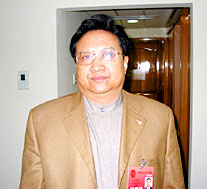 Grain distribution companies should play more of an important role
in the development of China's agriculture, according to Liu Xianlu,
a deputy from Jilin Province to the 10th National People's
Congress.
Grain distribution companies should play more of an important role
in the development of China's agriculture, according to Liu Xianlu,
a deputy from Jilin Province to the 10th National People's
Congress.
Liu is the general manager of the Jilin Grain Corporation: a
state-owned enterprise, founded in 1996 with 25 subsidiary
companies, 10 shareholding companies and total assets of 8.56
billion yuan.
"The farmer is the core problem of agriculture in these areas: How
to raise their income and solve the employment issue," he said, in
an exclusive interview with China.org.cn
As
the price of farm produce has been consistently low in recent
years, farmer's confidence has dropped. The government has
responded by securing farming interests by setting a protective
price policy for grain producers which guarantees a minimum price
for certain grain types.
"But the problem is that 40 percent of the government's
agricultural subsidies are given to some grain distribution
companies," Liu said, urging the government to explore more ways to
subsidize farming, for example, seed production and farming
machinery. He said that the protective price policy has made
farmers dependent on government assistance.
"The price of farm produce should be set according to the demands
and supply of the market. Farmers should adjust agricultural
structure to develop technology-intensive production according to
market demand while grain distribution enterprises should shoulder
the responsibility of conveying market information to farmers,
helping them to sell grain in both domestic and overseas markets,"
he said.
He
said it would also be possible to reduce risks by hedging goods in
the futures market.
At
the moment rural surplus labor goes to the cities and creates
pressure there. Liu believes that the farmers should stay put. He
was critical of the government for driving farmers to the cities to
look for work.
"Modern farmers should learn the technology to enable farming as
well as market information. The very important thing being that if
they learn these models and use the relationships between
processing producers and distribution companies, they will
prosper," Liu told China.org.cn.
His company set up experimental agribusiness in Fuyu County, Jilin
Province last year. The grain corporation signed a renting contract
of the land of 82 local households. Farmers can get 2,500 yuan for
10 mu (0.66 hectare) by selling operational rights to the
company and paying no tax or fees. "Our company helps farmers to
develop industry on their land," he said.
He
concluded that it was possible to raise farming income and solve
the employment surplus issue but that it needed further cooperation
from the government with policy support and market instruction.
Grain circulation companies in strengthening their links with the
farmers would not only increase farming income and help the
employment issue but would also strengthen the domestic
agricultural infrastructure in China in line with competitive
demands made by the membership of the WTO.
(China.org.cn by Staff Reporter Tang Fuchun, March 11, 2003)
|

